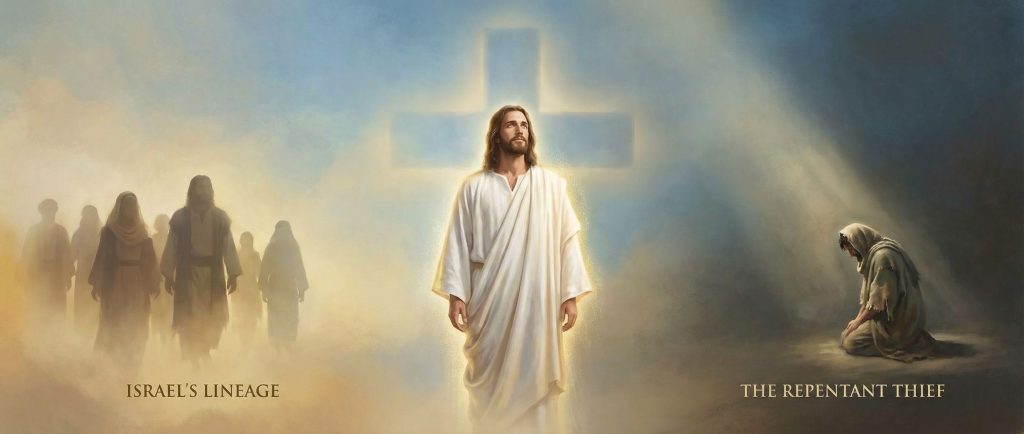Theme: THE KINGSHIP OF CHRIST
Readings: 2 Samuel 5:1–3, Colossians 1:12–20, and Luke 23:35–43.
The Solemnity of our Lord Jesus Christ as King
1. Introduction
Today, on the final Sunday of the liturgical year, the Church proclaims with joy and conviction that Christ is King—the Alpha and the Omega, the beginning and the end. The Solemnity of Christ the King is not a celebration of earthly power or political triumph. It is a proclamation that in Jesus Christ, the crucified and risen Lord, God’s eternal plan for humanity finds its meaning and fulfillment. Christ’s kingship is unlike any kingdom the world has known, as this homily reminds us.
2. Christ, Son of King David
Our first reading from 2 Samuel 5 shows the tribes of Israel gathering around David to anoint him king. God had chosen David to shepherd His people, to rule not by domination but in covenant faithfulness. This scene prepares us for Christ, the promised and true Son of David.
When the people said to David, “Here we are, your bone and flesh,” they foreshadowed the mystery fulfilled in Christ’s Incarnation. Jesus is truly our “bone and flesh,” a King who shares fully in our humanity. And yet, unlike David—who succeeded in some things and failed in others—Jesus fulfills perfectly the promise of a shepherd-king who guides His people into peace, justice, and salvation. He is the Davidic King whose reign has no end.
3. The Divinity of Christ
St. Paul, in our second reading from Colossians 1, lifts our vision beyond the earthly lineage of Jesus to His eternal identity. Paul proclaims that Christ is “the image of the invisible God,” the one in whom “all the fullness” of God dwells. He is not merely a great teacher or a noble martyr, not simply a successor to David—He is God made visible, the Word through whom all things were created.
This passage leaves no room for reducing Jesus to a political or moral leader; He is the divine Son, eternal before all ages, whose kingship arises not only from genealogy but from His very nature as God. His authority is absolute, eternal, and universal.
4. The Kingdom of Christ
Christ’s kingdom is not like the kingdoms of this world. In the gospel reading from Luke 23, we see Jesus reigning from the cross—a scene that turns all human expectations upside down. The Jewish rulers mock Him, the soldiers taunt Him, and one criminal derides Him. But it is precisely here, in His total self-giving love, that Jesus reveals the nature of His kingdom. His kingdom is a kingdom of mercy, where the repentant thief hears the most royal decree ever spoken: “Today you will be with me in Paradise.” Christ’s kingdom is established not by force, but by forgiveness; not by violence, but by sacrificial love.
5. Christ’s Kingship over the Church
Christ the King rules His Church—not as a distant monarch, but as the head of His Body. Paul tells us in Colossians that Christ is “the head of the body, the Church.” Christ is the head of the Church in a way that no founder of an organization or head of an institution can compare with. He is the very source and unity of the Church, and intimately linked with her as a head is with the body. He governs her with divine authority expressed in love; and His rule is for all eternity.
Christ’s authority guides the Church’s teachings, sanctifies her sacraments, and animates her mission. Every act of evangelization, every work of mercy, every moment of worship flows from Him and returns to Him, in Whom alone the Father is pleased. To be part of the Church, then, is to belong to a kingdom that stretches across the world and through the centuries, united under one Lord and Shepherd.
6. Christ’s Kingship over All Creation
Christ is not only King of the Church, but—St. Paul says—“in Him all things were created… visible and invisible.” His kingship extends over angels and archangels, over galaxies and grains of dust, over time and eternity.
Nothing in creation is outside His dominion. No political empire, no scientific discovery, no technology, no cultural movement, no spiritual power stands apart from His authority. His kingship unites heaven and earth, the physical and the spiritual, the seen and the unseen. This means that everything, absolutely everything, finds its meaning and coherence only in Him.
7. Christ’s Kingship over Life and Death
In His Passion and Resurrection, Christ has conquered the last and greatest enemy: death itself. On Calvary, He reveals His kingship over death when He promises Paradise to the repentant thief. His kingdom extends into the realm where no earthly king can rule—the kingdom of eternity.
By rising from the dead, Christ shows that His authority is not limited to this world. He reigns over the living and the dead. He holds the keys of life, hope, and eternal destiny. To submit to Christ the King is to place our lives in hands that even death cannot break.
8. Conclusion
What, then, are the fruits of acknowledging Christ as King?
- Peace—because His mercy reconciles us to the Father.
- Purpose—because His kingdom gives meaning to our lives.
- Protection—because no power in heaven or the universe can separate us from His love.
- Hope — because in Him, through Whom the repentant thief entered Paradise, our eternal life is assured
To submit to Christ’s kingship is not to lose freedom, but to find true freedom—the freedom to become who we were created to be. As we end one liturgical year and prepare for Advent, let us renew our allegiance to the King who loves us, leads us, and saves us.
May Christ our King reign in our hearts, in our families, in our Church, and in all creation—now and forever. Amen.
By Most Rev. John Kobina Louis
